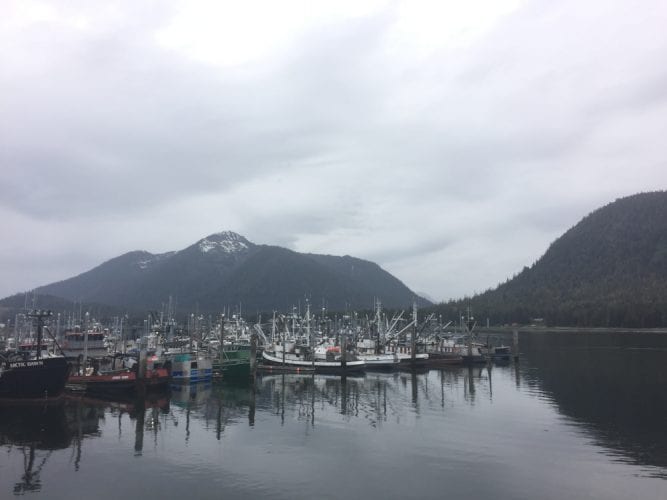
Right about now, fishermen from all over the state are converging on Bristol Bay, in Western Alaska, to work the region’s legendary sockeye salmon run. Captains and crews from Petersburg have been fishing there for decades, and recent blockbuster years have helped attract a new generation to the Bay. Ari Snider spoke with captains and crew members about the community of Southeast fishermen that has formed 900 miles away.
When Jim Schwartz first showed up in Bristol Bay in 1979, all he had with him was his rain gear, a pair of Xtratuf boots, and two boxes of fruit.
“My wife insisted that I take two cases of cherries up,” Schwartz said. “She said you never know when that might help you.”
Turns out, they helped him a lot. Schwartz was looking for a job, and he bartered away the first box of cherries to a captain who let him use the ship’s radio to scout out job offers. He dangled the second case as a sort of reverse hiring bonus.
“So I got on the radio with him and said ‘This is Jim Schwartz from Petersburg I’ve fished you know picked fish before, I’ve got a case of cherries and I’m ready for hire,'” he said.
That was good enough to land him a job with a captain who was also from Petersburg. Schwartz went on to fish the Bay every summer for the next thirty-plus years before selling his boat and his permit last year. Schwartz was a teacher at the time and says it fit well with his teaching schedule and also allowed him to augment his public school salary. Now, those same reasons have attracted Nels Evens, also of Petersburg, to Bristol Bay. Evens just finished up his fourth year of college, where he’s studying to be a teacher, and last summer was his first as a captain on the Bay. He says the community of Petersburg fishermen was an important source of support.
“It was really nice my first year when I had no clue what I was getting into to start seeing more and more people that I didn’t know went up there, and you’re like oh, there are a lot of friendly faces here,” he said.
As Evens heads back for another season, he’ll be teaming up with a few other young captains, some of whom are from Petersburg or have ties here. This, combined with another year of experience, has Evens feeling more confident.
“I’m a lot more relaxed now that I know what I’m going up for,” Evens said. “Looking at the numbers, looks like it’s gonna be a strong, healthy run.”
The main reason that Southeast fishermen like Evens go all the way to Bristol Bay is that there’s a lot of money to be made there, especially in recent years. Last summer saw the biggest sockeye salmon return on record: 62.3 million fish. The total ex-vessel value for all that sockeye was over $275 million dollars.
But you can’t just waltz in there and make a fortune. First, you need a gillnet permit, which these days is going for around $175,000. And if you do secure a permit, you have to be prepared to jump into one of the most demanding fisheries in the state. Lasting only about six weeks, it’s a mad dash to land as much fish as possible.
Sam Marifern, another young Petersburg fisherman, says the intensity is a challenge, but it can also be part of the draw.
“When we’re actually out on the water it can be pretty miserable, you know just weather and no sleep,” Marifern said. “But sometimes hard work feels good too so it’s very rewarding.”
Marifern says she has been working on her dad’s boat for the last nine years. She says one strategy to cope with the long hours, little sleep, and backbreaking work is to seize every opportunity to goof around with other Petersburg boats.
“Well it’s really funny cause we know each others’ boats or you know what boat your buddy’s on, so we light bottle rockets off at each other,” she said. “Maybe I’m not supposed to say that on air I don’t know but you know you make little jokes and that’s how you entertain yourself for that long when you’re stuck on a 32-foot boat.”
Marifern and Evens are not the only young people who have set their sights on Bristol Bay. Dave Owens, a teacher who also fishes up there, says he’s seen increased curiosity from his high school students.
“Used to be that nobody wanted to go to the Bay, you could make more money seining,” Owens said. “Now a lot of students are pretty interested in getting to Bristol Bay.”
But, Owens says, this trend will likely change depending on the strength of future fish returns.
“And then that’ll fade, everything goes through a cycle and pretty soon it’ll be hard to find crew up there again and they’ll all want to be rich seine fishermen,” he said.
As Owens, Marifern, Evens, and other Petersburg fishermen work another season on Bristol Bay, Jim Schwartz is preparing for something unusual: His first summer vacation since he was a teenager. But that doesn’t mean he’s going to stay off the water.
“I’m looking forward to the idea of going up the creek and doing some other kinds of fishing and other kinds of exploration,” Schwartz said.
As for advice to younger fishermen looking to make it in the Bay, Schwartz says the most important things to do are invest in solid equipment and hire a dependable crew. And of course, it never hurts to pack a couple extra boxes of cherries.











